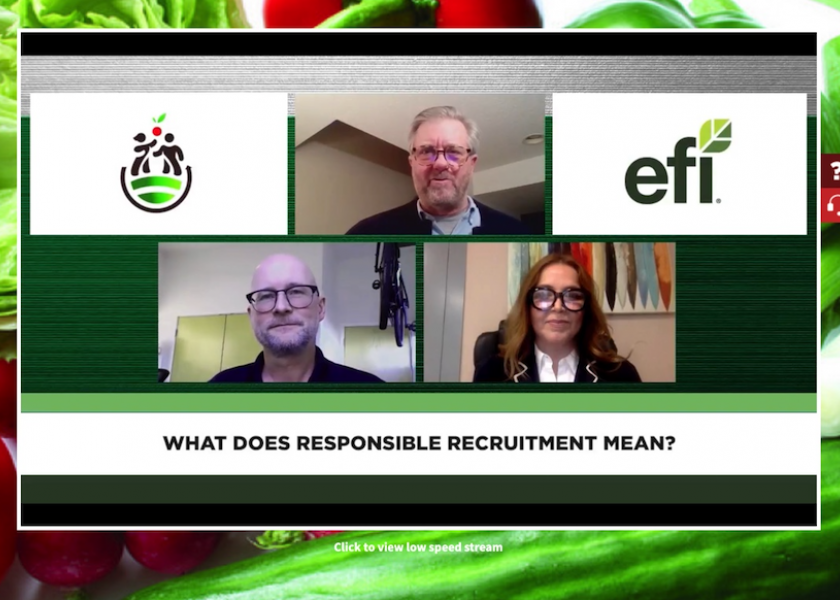When Mexican farmworkers aren't charged fees, it's better for your business

You’ve got more than enough on your plate, but you know you need good people to make your business work.
A people-first approach to your business or farm starts with how you recruit your labor — a tougher than ever part of the produce business, with labor shortages, the pandemic’s unpredictable market, changing immigration rules and a 4.5% increase in the H-2A Adverse Effect Wage Rate in 2021.
In a March 16 webinar hosted by The Packer’s editor in chief Tom Karst, agriculture labor recruiter Cierto teamed with Equitable Food Initiative for a deep dive into responsible recruitment, focusing on how a farm can go beyond reducing its risks and create a consistent labor pool of qualified professionals.
But first, let’s look at a worst-case scenario.
“Poor recruitment practices lead to forced labor, and the gravity of that needs to settle in,” said Kenton Harmer, managing director of EFI.
The pay-to-work schemes are where recruitment fees tend to happen.
“Many of the most egregious practices happen upstream of the farm gate,” Harmer said. “It’s not fair. You’re not in the community. You’re not charging these fees. Guess what? When the LA Times uncovers this, they’re not naming the recruiter; they’re naming the grower.”
Responsible recruitment not only mitigates risks, it also provides opportunities.
“We are matching the worker’s profile to the commodity to be harvested, instead of just selecting workers by gender or by number of workers needed,” said Norma Encinas, H-2A program director at Cierto, which recruits, trains and places experienced agricultural workers from Mexico on farms in the U.S. “Workers selected under this approach protect all parties’ interests and saves time and money.”
These verified, screened, trained and fully informed workers are matched better to the job, are more productive and want to return to the same farm year after year.
It’s also what retailers, other customers and consumers are asking for, in the name of transparency and social responsibility.
More and more, company leaders are having to prove their workers are treated right from their point of origin, on their journey to the U.S. farm, during the job and on their return home.
This can get really complicated, Harmer said. Start by looking at the recruiters you currently use and fill out the new EFI Responsible Recruitment Scorecard, available free at equitablefood.org/scorecard.
“Just get started. You don’t have to be perfect. We don’t expect recruitment fees to disappear overnight. Through credible effort, good data, partnerships and strategy, you’re going to see progress,” Harmer said.
Talk to your labor providers, he said. Ask them these questions in the scorecard. See what you need to work on first.
“Knock off one risk at a time, and you’ll find those commercial advantages of recruiting responsibility,” he said.
Brand integrity is invaluable, and this is a way to achieve it.
With trained, professional workers who weren’t charged unfairly on the journey, company leaders will achieve better food safety, better productivity and a competitive advantage.
“I’ll leave you with this question,” Encinas said. “In the event that your buyer establishes ethical recruitment, and the purchase of your product depends on that, are you in the position to comply?”
Related news:
What Cierto's ethical recruitment really means for people
EFI relaunches Responsible Recruitment Scorecard
Check out the People First: Social Responsibility Webinar Series







